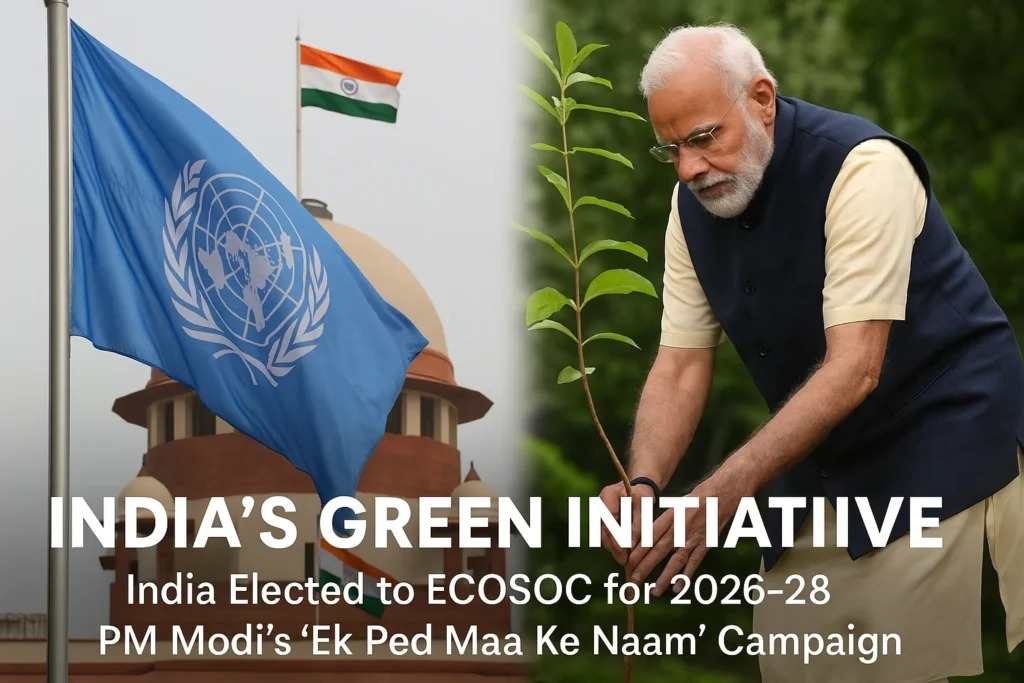Introduction: A Double Win for a Greener Planet
Imagine a nation not just speaking about global challenges on the world stage, but actively rolling up its sleeves and planting the seeds of change at home. This is the story unfolding in India, a country making significant strides in its commitment to a sustainable future. Recently, India secured a prestigious seat on the United Nations Economic and Social Council (ECOSOC) for the 2026-28 term. This diplomatic win places India at the heart of global development discussions. But its commitment doesn’t stop in the hallowed halls of the UN. On the home front, Prime Minister Modi has launched an inspiring environmental campaign, ‘Ek Ped Maa Ke Naam’ (A Tree in Mother’s Name), with the ambitious goal of planting a staggering 10 crore (100 million) trees by September.
These two events, one a testament to India’s growing global influence and the other a grassroots movement for ecological revival, paint a compelling picture. They show a nation that understands the intricate link between international cooperation and local action. It’s a journey from global diplomacy to community planting, demonstrating India’s multi-pronged approach to becoming a leader in environmental stewardship. Let’s explore how these initiatives are shaping India’s green future.
At the Global Helm: India’s ECOSOC Election
The United Nations Economic and Social Council, or ECOSOC, might not grab headlines like the Security Council, but it is a profoundly important body. Think of it as the UN’s central engine for coordinating economic, social, and environmental cooperation. Being elected to ECOSOC for the 2026-28 term is a significant diplomatic achievement for India, giving it a powerful voice in shaping global policies on sustainable development.
ECOSOC’s Pivotal Role
ECOSOC is one of the six main organs of the United Nations. Its responsibilities are vast and crucial:
- Sustainable Development: It is the primary platform for reviewing, discussing, and recommending policies on sustainable development, including the 2030 Agenda for Sustainable Development and its 17 Sustainable Development Goals (SDGs).
- Policy Coordination: It serves as a central forum for discussing international economic and social issues and formulating policy recommendations.1
- Humanitarian Affairs: It also plays a key role in coordinating humanitarian aid and addressing social challenges like poverty, health, and education.
- Engaging Stakeholders: ECOSOC involves not just governments but also civil society, academia, and the business sector in its work, making it a truly inclusive platform.
For India, securing a seat on this influential body is a recognition of its growing economic prowess, its commitment to the SDGs, and its unique perspective as a large, developing nation navigating the complexities of growth and sustainability. It provides a platform to advocate for policies that benefit not just India, but the wider Global South.
India’s Voice for Global Sustainability
India’s election to ECOSOC is more than just a diplomatic feather in its cap; it’s an affirmation of its long-standing commitment to sustainable development and its increasing role as a global leader on environmental issues. This seat allows India to amplify its voice and bring its unique experiences to the forefront of international policy-making.
A Track Record of Engagement
India has consistently emphasized the importance of sustainable development, even as it pursues its own rapid economic growth. Its past engagement with ECOSOC and various UN forums reflects this commitment:
- Championing the Global South: India often advocates for the needs and perspectives of developing nations, pushing for equitable solutions to global challenges.
- Climate Action: Despite its developmental needs, India has taken ambitious climate action, including significant investments in renewable energy and setting ambitious emission reduction targets.
- Lifestyle for Environment (LiFE) Initiative: Prime Minister Modi launched the LiFE movement, promoting sustainable lifestyles based on traditional Indian values of moderation and conservation. This initiative, now gaining international traction, could be further promoted through ECOSOC.
- International Solar Alliance (ISA): Co-founded by India and France, the ISA is a global effort to promote solar energy, demonstrating India’s proactive role in fostering international cooperation for sustainable energy.
Being part of ECOSOC gives India the opportunity to directly influence the global agenda on poverty eradication, health, education, climate action, and peace. It allows India to share its successes, learn from others, and push for collective solutions to pressing global challenges.
A Nation’s Green Promise: ‘Ek Ped Maa Ke Naam’ Campaign
While India asserts its influence on the global stage, its commitment to environmental protection truly shines through its ambitious domestic initiatives. At the forefront of these is Prime Minister Modi’s deeply personal and widely impactful campaign: ‘Ek Ped Maa Ke Naam’ (A Tree in Mother’s Name). This isn’t just a government program; it’s a movement aimed at inspiring every citizen to contribute to a greener future.
The Power of 10 Crore Trees
The core of the campaign is simple yet monumental: to plant 10 crore trees by September. To put that number into perspective, 10 crore is 100 million trees. This is an enormous undertaking, designed to happen across the length and breadth of India. The initiative carries a powerful emotional appeal: dedicating a tree to one’s mother or mother figure. This personal touch aims to foster a deeper connection between individuals and nature, transforming a civic duty into an act of love and respect.
The campaign encourages:
- Individual Participation: Every citizen, regardless of age or background, is urged to plant at least one tree.
- Community Involvement: Schools, colleges, government bodies, NGOs, and local communities are expected to organize mass planting drives.
- Symbolic Value: Linking tree planting to the revered figure of a mother in Indian culture gives the campaign a unique, sentimental, and deeply resonant aspect, hoping to instill a sense of responsibility and care for the environment.
This campaign isn’t just about statistics; it’s about fostering a nationwide culture of environmental stewardship, reminding everyone that protecting nature is a duty passed down through generations.
Planting the Seeds of Change: Implementation and Participation
The success of a massive initiative like ‘Ek Ped Maa Ke Naam’ hinges on its practical implementation and the widespread participation of communities. While the directive comes from the top, the real action happens on the ground, in villages, cities, schools, and homes across India.
A Nationwide Effort
To achieve the target of 10 crore trees planting, the campaign relies on a multi-pronged strategy:
- Government Departments: Ministries of Environment, Forest and Climate Change, Agriculture, Rural Development, and others work in coordination to identify suitable land, provide saplings, and facilitate planting drives.
- Local Bodies: Panchayats (village councils) and urban local bodies play a crucial role in mobilizing local communities and allocating public spaces for planting.
- Educational Institutions: Schools and colleges are encouraged to organize tree planting events, involving students and instilling environmental values in the younger generation.
- Volunteers and NGOs: Environmental organizations and volunteer groups are key partners, providing expertise and grassroots mobilization.
- Digital Platforms: The government might utilize digital platforms to track progress, share success stories, and encourage broader participation, perhaps even allowing individuals to register their planted trees.
The campaign encourages planting indigenous species suitable for local ecological conditions, ensuring higher survival rates and better ecological benefits. It’s a vision where every citizen contributes to a collective forest, making India greener one tree at a time. This widespread engagement is vital to transform a national goal into a personal commitment for millions.
The Broader Vision: India’s Commitment to a Green Future
The ‘Ek Ped Maa Ke Naam’ campaign is part of a much larger, overarching vision for India: a commitment to sustainable development and a leadership role in global environmental efforts. India recognizes that its economic growth must be balanced with ecological preservation, and that its actions at home resonate globally.
Integrating Development and Environment
India’s approach to environmental sustainability is deeply integrated with its development agenda. This includes:
- Renewable Energy Push: Massive investments in solar and wind power, aiming to reduce reliance on fossil fuels. India is rapidly expanding its renewable energy capacity.
- National Green Hydrogen Mission: A focus on producing green hydrogen to decarbonize industries and achieve energy independence.
- Clean India Mission (Swachh Bharat Abhiyan): A national sanitation and cleanliness drive that contributes to environmental health.
- Circular Economy Initiatives: Promoting recycling, reuse, and waste reduction to minimize environmental impact.
- Forest Cover Expansion: Ongoing efforts to increase India’s forest and tree cover, recognized globally for its positive impact on carbon sequestration and biodiversity.
These initiatives demonstrate that India is not just reacting to climate change but proactively shaping a greener future. The ‘Ek Ped Maa Ke Naam’ campaign serves as a powerful symbol of this commitment, bringing the national vision down to the individual and community level.
Impact and Inspiration: A Message to the World
The combined force of India’s election to ECOSOC and its ambitious ‘Ek Ped Maa Ke Naam’ campaign sends a clear and inspiring message to the world. It showcases a nation that is not only dedicated to its own environmental well-being but is also stepping up to contribute to global sustainability goals.
A Model for Action
- Global Advocacy: India’s presence on ECOSOC provides a platform to advocate for climate justice, technology transfer, and financial support for developing countries in their green transition.
- Grassroots Empowerment: The ‘Ek Ped Maa Ke Naam’ campaign demonstrates how large-scale environmental action can be driven by community participation and emotional connection, offering a potential model for other nations.
- Showcasing Solutions: India can share its experiences and innovations in areas like renewable energy, sustainable agriculture, and water management with the international community through ECOSOC.
- Inspiring Responsibility: The campaign’s unique emotional appeal could inspire similar initiatives elsewhere, fostering a global sense of individual responsibility towards the planet.
By acting locally with ‘Ek Ped Maa Ke Naam’ and thinking globally through its ECOSOC role, India is positioning itself as a vital player in the global effort to combat climate change and achieve sustainable development. It’s a powerful narrative of a nation planting not just trees, but seeds of hope for a healthier planet.
Conclusion: India’s Dual Path to a Sustainable Future
India’s recent election to the United Nations Economic and Social Council (ECOSOC) for the 2026-28 term, coupled with Prime Minister Modi’s inspiring ‘Ek Ped Maa Ke Naam’ environmental campaign, truly highlights a nation committed to a sustainable future on both the global and domestic fronts.
The ECOSOC seat solidifies India’s role at the heart of international discussions on economic, social, and environmental cooperation, allowing it to champion the cause of sustainable development for all. Simultaneously, the ambitious ‘Ek Ped Maa Ke Naam’ campaign, aiming to plant 10 crore trees by September, translates this global commitment into tangible, grassroots action. By connecting tree planting to the revered figure of a mother, the campaign fosters a deep, personal bond with nature, inspiring widespread community participation. This dual approach—influencing global policy while mobilizing local action—demonstrates India’s holistic and strategic vision for a greener, more sustainable future. India is not just planting trees; it is planting the seeds of a new environmental consciousness that resonates from the UN chambers to every community across the nation.



